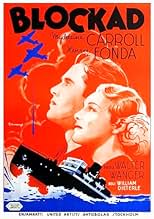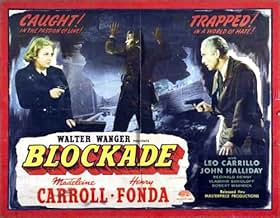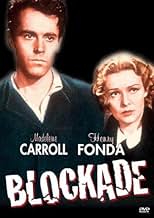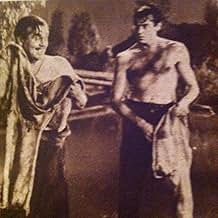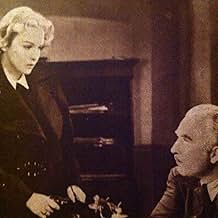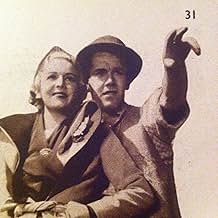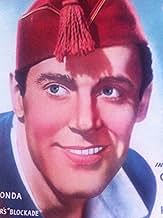Füge eine Handlung in deiner Sprache hinzuA simple peasant is forced to take up arms to defend his farm during the Spanish Civil War. Along the way he falls in love with Russian whose father is involved in espionage.A simple peasant is forced to take up arms to defend his farm during the Spanish Civil War. Along the way he falls in love with Russian whose father is involved in espionage.A simple peasant is forced to take up arms to defend his farm during the Spanish Civil War. Along the way he falls in love with Russian whose father is involved in espionage.
- Regie
- Drehbuch
- Hauptbesetzung
- Für 2 Oscars nominiert
- 3 Gewinne & 2 Nominierungen insgesamt
- Pietro
- (as Fred Kohler Sr.)
- Commandant
- (as Wm. B. Davidson)
- Cabaret Singer
- (as George Byron)
- Townswoman
- (Nicht genannt)
Empfohlene Bewertungen
The factions are referred to only as "Them" (invaders) and "Us" (invaded). The casus belli is no more than Their attempt to purloin Our land, a valley near Granada. What ensues is personalised, studio-bound melodrama. Heroic amateur soldier Henry Fonda stiffens his fellow peasants' backs to resist the grab. He woos blonde White Russian adventuress Madeleine Carroll and finally demands foreign intervention in a Chaplinesque harangue to camera: "Where's the conscience of the world?"
It all savours of Hays Office intervention and the anxiety of Lawson's "progressive" producer, Walter Wanger, not to provoke the US public by charging them for a liberal sermon. But "Blockade" may be subtler agitprop than it seems.
By 1938 anybody who read a paper or watched "The March of Time" would infer that Fonda stands for the Republic fending off General Franco's Nazi- and Fascist-backed Nationalists-- not the other way round. And Lawson's emphasis on small farmers guarding their ancestral acreage is just what Stalin ordered. In reality the country round Granada was a hotbed of anarchist schemes for collectivising agriculture, but the Communist line was that the Republic's left-front government, including democratic socialists and liberals, must be sustained till the rebel generals were routed. Only then could land reform be considered; reform under the aegis of a Communist-dominated regime subservient to Moscow, which would nationalise the land, not parcel it out to dubious anarchic types.
Moreover, Lawson must have relished making Carroll's character an exiled daughter of Russia with a crooked anti-Red father, who sees the light in Fonda's arms.
We laugh at movies such as this and "Last Train from Madrid" for their superficial, sentimental view of a burning issue. But what right has today's supposedly more liberated Hollwood to laugh? Where were Vietnam films during the conflict, apart from John Wayne's "Green Berets"? How many Gulf War or Enduring Freedom stories have we seen? How many portrayals of radical Islam, pro or anti? Hollywood is more gutlessly evasive than ever during our dangerous times. Well, export markets provide more of its profit margin than 60 years ago...
The screenplay, as if you couldn't guess, is by one of the blacklisted Hollywood Ten, John Howard Lawson, who wrote a number of left-leaning works for both the theatre and cinema at this time and I must admit I was surprised to learn that this one was nominated for an Academy Award this particular year.
The story is both simple and contrived. A lowly, young Spanish farmer, Fonda, with his oafish chum encounters Carroll after she crashes her car at breakneck speed on the road where they're walking their cattle. Just as you wouldn't guess Fonda was a native Spaniard from his accent, Carroll we later learn despite her cut-glass English accent is actually a Russian whose father, we learn is aiding the fascist Nationalist forces, presumably at the behest of Stalin.
Then, of a sudden, the Spanish Civil War kicks off with Fonda's character seemingly unaware that it was even in the wind. Sure enough, he enlists on the underdog Republican side, although these descriptive terms are never used in the film and when he discovers Carroll's father's treachery to his country, shoots him dead. You might think that this would be enough to turn her forever against him but you'd be wrong, although initially she of course has to see the error of her ways, even if she seems to have betrayed the starving native Spaniards by passing on intelligence which enables the oppressors to sink each relief ship, bringing in essential food and supplies, attempting to break the imposed blockade.
It sort of all ends up all right in the end thanks to a cunning piece of duplicity by the resistance with Fonda and Carroll now firmly committed to fighting for their poor countrymen, women and children with the last word going to Fonda making a rallying call directly to the viewer for other countries to help his beleaguered nation as they will surely be next to be threatened by the rise of fascism in the west.
I'm all for the political motivations behind the movie which must have taken some bravery for the cast and crew to produce but really it's very heavy-handed in its writing, seems to be directed in a very-slapdash fashion by William Dieterle and is acted over-earnestly by Carroll and in particular Fonda.
I kind of wished the production had instead made the trip to Spain to film at first-hand in documentary fashion the horrors of this terrible war, but lame and stilted as this movie was, its heart at least was in the right place so I'll forgive some of its all too apparent flaws and give it a tacit nod of approval.
Politically,the film remains vague,always referring to the enemy as "they" like in Borzage 's 'three comrades" (but that was a great film though).The war was over on the first of March 1939;thus the film ,made in 1938,warns us ,in a clumsy way,that it's only the beginning:propaganda movies can be great,but it takes a strong screenplay (best example:"the mortal storm" Frank Borzage) and not a cat and mouse play between spies ,corrupt officers and profiteers of war.
In consequence ,the best scenes ,IMHO,are those which deal with the masses;the starving faces ,watching the ship sinking down are reminiscent of Eisenstein,whose influence was huge at the time.
"Blockade" is a case in point. The script was written by John Howard Lawson, one of the most hard-line Communists working in Hollywood, about the Spanish Civil War, a cause dear to the heart of every leftist. And yet its script is so confused that it is impossible to tell whether its politics are pro-Republican or pro-Nationalist.
Marco, a small farmer living somewhere near the Mediterranean coast of Spain, takes up arms to defend his land against the Bad Guys, and then becomes part of the Good Guys' army. He takes part in the defence of Castelmare, a port city held by the Good Guys but being blockaded by the Bad Guys who are hoping to starve it into surrender. The plot revolves around the attempts of the Good Guys to send a ship through the blockade to bring food to the starving citizens, and the attempts of the Bad Guys and their spies within the city to frustrate this plan by sinking the ship.
No doubt if Lawson had had his way he would have written a script which made it quite clear that the Good Guys were to be identified with the Republicans, but the studio- who doubtless felt that actually making a film about the conflict was quite brave enough- were determined that they should not be seen as favouring one side against the other, and the script was therefore neutered so as to ensure that the question of who the Good Guys and the Bad Guys actually were remained obscure. The film makes no reference to the International Brigades or to foreign intervention in the war, and all personal names and place names are fictitious. (The name "Castelmare" is actually Italian rather than Spanish, as is "Montefiore", another place mentioned in the film. The hero's name in Spanish would normally be "Marcos" rather than "Marco", and there are also characters with the Italian-sounding names "Pietro" and "Seppo". Lawson seems to have got confused about the differences between Spanish and Italian).
There are some factors which do indeed suggest that the Good Guys are intended to be identified with the Republicans, in particular the fact that the Bad Guys carry out air raids against civilian targets, a typically Nationalist tactic. Some have also pointed to the fact that the chief Bad Guy spies, a young woman named Norma and her father, are of Russian origin, although it should be mentioned that not all Russian émigrés at this period were Tsarists or even right-wingers; there were plenty of Russian liberals, social democrats, anarchists and Trotskyites in exile from Stalin's regime. (Norma later has a change of heart when she sees the suffering the blockade is causing, switches to the Good Guy side and becomes Marco's love-interest).
Other factors, however, suggest that the Good Guys are intended to be identified with the Nationalists, and not only the design of their uniforms which another reviewer mentioned. Marco mentions that the Bad Guys are targeting churches for destruction, just as the anarchists and communists did in the regions of Spain under their control. His taking up arms in defence of his land recalls the fact that the leftist programme of collectivising land forced many small farmers, who otherwise would have had little sympathy with Fascism, to support the Nationalist cause, fearing that in the event of a Republican victory they would share the fate of the Russian kulaks.
Yet despite its political incoherence the film has some good points. Indeed, it is perhaps the film's refusal to take sides that makes it still watchable more than seventy years on, certainly more watchable than a mere Francoist or anti-Francoist propaganda tract would be. Certainly, it is dated, something shown in those scenes which supposedly take place outdoors but which were in fact shot in a studio in front of very unconvincing-looking backcloths. Although it ends with a rousing peroration from Marco in which he calls for outside intervention in the war, its main interest today is as an anti-war drama, a film which shows us the human cost of war, a cost which remains the same whether the war is being waged by Good Guys or Bad Guys. 6/10
For political propaganda that both entertains and persuades, let me suggest Casablanca. For political propaganda that offers only a few glimpses of the radiant Madeleine Carroll and nothing more, I recommend Blockade. That, unfortunately, is not enough to salvage this less than scintillating 1930s leftist pap.
Wusstest du schon
- WissenswertesThe original title of this film was "The River is Blue" and the director was to be Lewis Milestone. Kurt Weill even wrote music for the project that was never used (lyrics by Ann Ronell). The title was changed to "The Rising Tide" and "Castles in Spain," then finally to "Blockade." The topic of the Spanish Civil War was politically sensitive and there is some hint that the upheavals of the original project were due to the political content of the film.
- Zitate
Marco: [last lines, after being told to find peace] Marco: Peace? Where can you find it? Our country's been turned into a battlefield! There's no safety for old people and children. Women can't keep their families safe in their houses; they can't be safe in their own fields! Churches, schools, hospitals are targets! It's not war; war is between soldiers! It's murder! Murder of innocent people! There's no sense to it. The world can stop it! Where's the conscience of the world?
- VerbindungenFeatured in Red Hollywood (1996)
Top-Auswahl
Details
Box Office
- Budget
- 692.087 $ (geschätzt)
- Laufzeit
- 1 Std. 25 Min.(85 min)
- Farbe
- Seitenverhältnis
- 1.37 : 1

